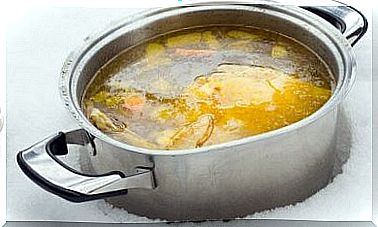Opioid Constipation: What To Do?

Opioid constipation is a common problem and capable of lowering the quality of life of those who use it. It is a consequence of the effect of some of these substances on the functionality of the intestine.
This is a problem that often has to contend with those who use these drugs. According to the available data, a high percentage – between 41 and 81% – of patients taking opioids have constipation.
Opioid analgesics are very effective in treating severe pain, to the point where the consumption of these drugs has increased by nearly 84% over the past decade. Consequently, cases of opioid constipation have also increased.
This is a problem that is not given sufficient importance, given that it significantly lowers a person’s quality of life. Those who cannot do without opioids to manage pain find themselves forced to cope with a disorder that involves great limitations.
When can we talk about constipation?

Those who have difficulty evacuating or have infrequent bowel movements are constipated. In general, we talk about constipation when you are unable to pass your body more than three times a week.
When the problem becomes chronic, it is usually accompanied by a number of bothersome symptoms. The stools appear as hard and dry, there is a sense of incomplete evacuation, pain and, often, there is a great production of intestinal gas.
There are many factors that can cause constipation, including taking certain medicines. In many cases, opioid drugs are responsible, but antidepressants, antihistamines, antiepileptics, antipsychotics, diuretics and others can also have the same effect.
Opioid constipation
Many medications can have side effects, but generally these tend to subside over time. However, this is not the case with opioid-induced constipation. It seems that the intestines cannot get used to these drugs.
The degree of constipation depends on the opioid taken, the amount and duration of the treatment. The higher the dosage and time of use, the higher the risk of developing a form of chronic constipation.
Constipation related to opioid drug consumption differs from common or functional constipation. This condition is indicated by the abbreviation OIC ( opioid induced constipation) and is, in principle, a temporary problem that tends to disappear when the responsible drug is discontinued.
How do opioids work?

Opioids exert their effect mainly on the central nervous system, but they also develop a peripheral action on other organs, including the gastrointestinal tract. They cause changes that prevent, among other things, the regular functioning of the intestine. Opioids typically interfere with the functioning of the gut in two ways.
The first is a condition called intestinal paralysis. To better understand what it is, let’s imagine the pressure we exert on a tube to release the toothpaste. Something similar happens in the intestine when it expels stool. The movement that occurs is involuntary and is called peristalsis. Opioids can limit or block this movement and the result is constipation.
The second effect of opioids is to dry out the stool making it very hard. Under normal conditions, the intestinal wall absorbs a part of the water from the stool during transit. But when opioids are taken, it is possible that such absorption becomes excessive, resulting in hard stools and constipation.
How to deal with opioid-induced constipation
For those on opioid treatment, it is essential to follow a healthy diet that includes plenty of fluids and fiber, as well as soft and nutritious foods. As we always do, we also recommend that you practice regular exercise to prevent the risk of severe constipation.
In many cases it will be essential to take laxative drugs that help soften the stool or facilitate intestinal function. Typically, a laxative is prescribed and if this does not work, more specific medications.
Before resorting to drugs, which in some cases are not really effective, you could try an abdominal massage. It does not cause any adverse effects and, if done correctly, can be very effective.









